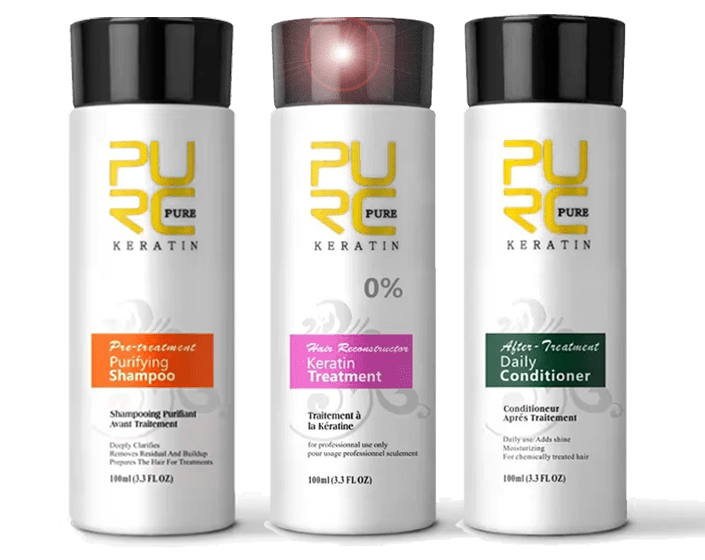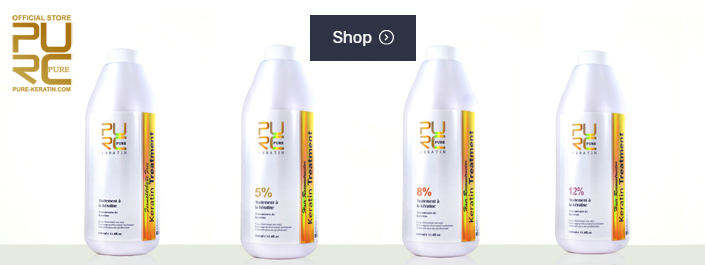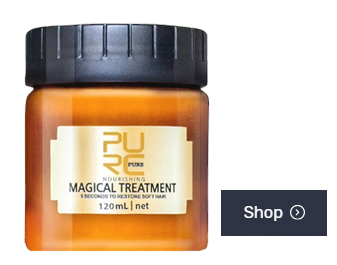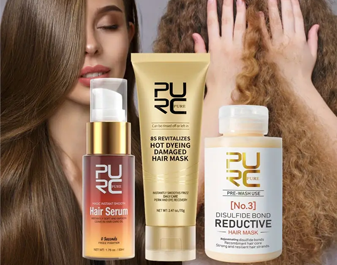Hair Mask: Boosting Your Hair's Health and Beauty
PURE KERATIN on 30th May 2023
| H1: Introduction | - What is a hair mask? |
| - Benefits of using a hair mask | |
| H2: Types of Hair Masks | - Deep conditioning masks |
| - Repairing and strengthening masks | |
| - Nourishing and moisturizing masks | |
| - Color-enhancing masks | |
| H3: How to Choose a Hair Mask | - Identify your hair type and concerns |
| - Consider the ingredients | |
| - Assess the formulation | |
| H4: How to Apply a Hair Mask | - Preparing your hair for the mask |
| - Applying the mask | |
| - Leave-in time and techniques | |
| H3: DIY Hair Mask Recipes | - Avocado and honey mask |
| - Coconut oil and egg mask | |
| - Yogurt and lemon mask | |
| H2: Tips for Maximizing the Effectiveness | - Use the right amount of product |
| - Focus on the ends and damaged areas | |
| - Incorporate heat or steam | |
| - Follow the recommended frequency | |
| H1: Conclusion | - Recap the benefits of using a hair mask |
| - Encourage readers to try incorporating hair masks | |
| FAQ | - How often should I use a hair mask? |
| - Can I leave a hair mask overnight? | |
| - Can I use a hair mask on colored hair? | |
| - How long should I leave a hair mask on? | |
| - Can I use a hair mask if I have oily hair? |
Hair Mask: Boosting Your Hair's Health and Beauty
Hair care is an essential aspect of our beauty routines, and we all desire luscious, vibrant hair. With the wide range of products available, it can be overwhelming to choose the right ones. One such product that has gained significant popularity in recent years is the hair mask. Hair masks are deep conditioning treatments that offer a multitude of benefits, ranging from nourishing and moisturizing the hair to repairing and strengthening damaged strands. In this article, we will delve into the world of hair masks, exploring their types, how to choose the right one, application techniques, and even some DIY recipes. So, let's dive in and discover the secret to healthier and more beautiful hair.
Types of Hair Masks
Deep Conditioning Masks
Deep conditioning masks are designed to provide intense moisture and hydration to dry, damaged, or over-processed hair. They penetrate deep into the hair shaft, replenishing lost moisture and restoring the hair's natural shine and softness. These masks are often enriched with ingredients like shea butter, argan oil, or keratin, which have excellent hydrating properties.
Repairing and Strengthening Masks
For those struggling with brittle, weak, or damaged hair, repairing and strengthening masks are the ideal choice. These masks contain ingredients such as protein complexes, amino acids, and vitamins that help fortify the hair strands, reduce breakage, and promote healthier growth. Regular use of these masks can revitalize and strengthen even the most damaged hair.
Nourishing and Moisturizing Masks
If your hair lacks luster, feels dry, or appears dull, nourishing and moisturizing masks can work wonders. These masks are formulated with nourishing oils like coconut oil, avocado oil, or olive oil, which deeply moisturize the hair, restoring its natural shine and vitality. They provide essential nutrients to the hair, leaving it soft, manageable, and full of life.
Color-Enhancing Masks
For those who love to experiment with hair color, color-enhancing masks are a game-changer. These masks are specifically formulated to enhance and prolong the vibrancy of colored hair. They contain color pigments that help revive and intensify the hue, whether it's a vibrant red, a beautiful brunette, or a stunning blonde. Using a color-enhancing mask regularly can help maintain your desired hair color and extend the time between salon visits.
How to Choose a Hair Mask
Now that we understand the different types of hair masks available, let's discuss how to choose the right one for your hair needs.
Identify your Hair Type and Concerns
The first step is to identify your hair type and specific concerns. Is your hair dry and damaged, oily and limp, or lacking shine? Understanding your hair's unique characteristics will help you narrow down the options and select a mask that addresses your specific needs.
Consider the Ingredients
When choosing a hair mask, it's essential to pay attention to the ingredients. Look for masks that are free of harsh chemicals like sulfates and parabens, as these can strip the hair of its natural oils and cause further damage. Instead, opt for masks with natural, nourishing ingredients like aloe vera, jojoba oil, or silk proteins that provide the nutrients your hair craves.
Assess the Formulation
The formulation of the hair mask also plays a crucial role in its effectiveness. Check if the mask is designed for regular or deep conditioning treatment. Consider your lifestyle and the amount of time you can dedicate to your hair care routine. If you're often on the go, a mask with a shorter leave-in time might be more convenient.
How to Apply a Hair Mask
Now that you've chosen the perfect hair mask for your needs, it's time to learn how to apply it correctly for maximum benefits.
Preparing your Hair for the Mask
Before applying the hair mask, ensure your hair is clean and free from any styling products or buildup. Shampoo and gently towel-dry your hair to remove excess moisture.
Applying the Mask
Take a generous amount of the hair mask and distribute it evenly throughout your hair. Focus on the mid-lengths and ends, as these areas tend to be more prone to dryness and damage. Use your fingers or a wide-tooth comb to comb the mask through your hair, ensuring every strand is coated.
Leave-in Time and Techniques
The leave-in time for hair masks can vary, so be sure to read the instructions on the product. Some masks require a few minutes to work their magic, while others can be left on overnight for deep conditioning. Experiment with different techniques to find what works best for you. You can wrap your hair in a warm towel or use a shower cap to create a gentle heat that helps the mask penetrate the hair shaft.
DIY Hair Mask Recipes
If you prefer natural alternatives or want to save some money, creating your own DIY hair masks can be a fun and rewarding experience. Here are a few simple recipes to try:
Avocado and Honey Mask
- Mash one ripe avocado and mix it with two tablespoons of honey.
- Apply the mixture to your hair, focusing on the ends.
- Leave it on for 30 minutes, then rinse thoroughly and shampoo as usual.
- This mask nourishes and moisturizes the hair, leaving it silky smooth.
Coconut Oil and Egg Mask
- In a bowl, whisk together one tablespoon of coconut oil and one egg.
- Apply the mixture to damp hair, starting from the roots to the ends.
- Cover your hair with a shower cap and leave it on for 45 minutes to an hour.
- Rinse thoroughly with lukewarm water and shampoo as usual.
- This mask helps repair and strengthen damaged hair, giving it a healthy shine.
Yogurt and Lemon Mask
- Mix half a cup of plain yogurt with the juice of one lemon.
- Apply the mixture to clean, damp hair, focusing on the scalp.
- Leave it on for 20-30 minutes, then rinse thoroughly.
- This mask helps balance the scalp's pH level and adds shine to your hair.
Tips for Maximizing the Effectiveness
To make the most out of your hair mask treatments, consider the following tips:
- Use the right amount of product: Follow the recommended amount specified on the product packaging. Using too little may not provide adequate coverage, while using too much can weigh your hair down.
- Focus on the ends and damaged areas: Concentrate the application of the mask on the ends of your hair and any damaged or brittle areas. These parts require extra attention and nourishment.
- Incorporate heat or steam: If possible, use heat or steam to enhance the mask's effectiveness. You can wrap your hair in a warm towel or use a steamer to create a gentle heat that opens up the hair cuticles, allowing the mask to penetrate deeper.
- Follow the recommended frequency: Read the instructions on the hair mask to determine how often you should use it. Overusing the mask can lead to product buildup, while underusing may not provide the desired results.
Conclusion
In conclusion, incorporating a hair mask into your hair care routine can significantly improve the health and beauty of your locks. Whether you choose a deep conditioning mask, a repairing and strengthening mask, a nourishing and moisturizing mask, or a color-enhancing mask, the benefits are undeniable. By choosing the right mask for your hair type, considering the ingredients and formulation, and following the correct application techniques, you can achieve luscious, vibrant hair that turns heads.
So why wait? Treat yourself to a pampering hair mask session and unlock the potential of your hair. Experience the transformative power of these treatments and enjoy the renewed confidence that comes with healthy, beautiful hair.FAQs (Frequently Asked Questions)
Q: How often should I use a hair mask? A: The frequency of using a hair mask depends on your hair's condition and the instructions provided by the specific product. As a general guideline, using a hair mask once a week or every two weeks should be sufficient for most people.
Q: Can I leave a hair mask overnight? A: Some hair masks are specifically designed for overnight use. However, it's important to read the instructions on the product and ensure that leaving it on overnight is recommended. Leaving a mask on for an extended period can provide deeper conditioning, but make sure it won't cause any adverse effects.
Q: Can I use a hair mask on colored hair? A: Yes, you can use a hair mask on colored hair. In fact, using a color-enhancing mask can help maintain and enhance the vibrancy of your hair color. Just make sure to choose a mask specifically formulated for colored hair and follow the instructions provided.
Q: How long should I leave a hair mask on? A: The recommended leave-in time for a hair mask varies depending on the product. It can range from a few minutes to several hours. Always refer to the instructions provided by the specific mask you are using to ensure optimal results.
Q: Can I use a hair mask if I have oily hair? A: Yes, you can still benefit from using a hair mask even if you have oily hair. However, it's important to choose a mask that is lightweight and specifically formulated for oily or fine hair. Look for masks that provide nourishment without weighing your hair down or leaving it greasy. Focus on applying the mask to the mid-lengths and ends, avoiding the scalp area to prevent any excess oiliness.
Now is the perfect time to give your hair the love and care it deserves. By incorporating a hair mask into your routine, you can transform your locks from dull and lifeless to vibrant and luscious. Choose from a variety of hair mask types, such as deep conditioning masks, repairing and strengthening masks, nourishing and moisturizing masks, or color-enhancing masks. Consider your hair type and specific concerns to select the perfect mask for you.
Remember to pay attention to the ingredients, opting for natural and nourishing ones that promote healthy hair. Take the time to properly apply the mask, focusing on the ends and damaged areas, and experiment with techniques like incorporating heat or steam to enhance its effects. For those who prefer a more hands-on approach, try out some DIY hair mask recipes using simple ingredients found in your kitchen.
To maximize the effectiveness of your hair masks, follow tips like using the right amount of product, focusing on the ends, incorporating heat or steam, and adhering to the recommended frequency. By following these guidelines, you'll experience the full benefits of a hair mask and achieve the beautiful, healthy hair you've always desired.
So why wait? Treat yourself and your hair to the luxurious experience of a hair mask. Unlock the secrets to strong, shiny, and enviable locks. Take the first step towards a hair transformation that will leave you feeling confident and beautiful.
FAQs (Frequently Asked Questions)
Q: How often should I use a hair mask?
A: The frequency of using a hair mask depends on your hair's condition and the instructions provided by the specific product. As a general guideline, using a hair mask once a week or every two weeks should be sufficient for most people.
Q: Can I leave a hair mask overnight?
A: Some hair masks are specifically designed for overnight use. However, it's important to read the instructions on the product and ensure that leaving it on overnight is recommended. Leaving a mask on for an extended period can provide deeper conditioning, but make sure it won't cause any adverse effects.
Q: Can I use a hair mask on colored hair?
A: Yes, you can use a hair mask on colored hair. In fact, using a color-enhancing mask can help maintain and enhance the vibrancy of your hair color. Just make sure to choose a mask specifically formulated for colored hair and follow the instructions provided.
Q: How long should I leave a hair mask on?
A: The recommended leave-in time for a hair mask varies depending on the product. It can range from a few minutes to several hours. Always refer to the instructions provided by the specific mask you are using to ensure optimal results.
Q: Can I use a hair mask if I have oily hair?
A: Yes, you can still benefit from using a hair mask even if you have oily hair. However, it's important to choose a mask that is lightweight and specifically formulated for oily or fine hair. Look for masks that provide nourishment without weighing your hair down or leaving it greasy. Focus on applying the mask to the mid-lengths and ends, avoiding the scalp area to prevent any excess oiliness.
Don't wait any longer to give your hair the care it deserves. Unlock the secrets to healthier, more beautiful hair with the power of a hair mask. Try it for yourself and experience the difference. Your hair will thank you.



















